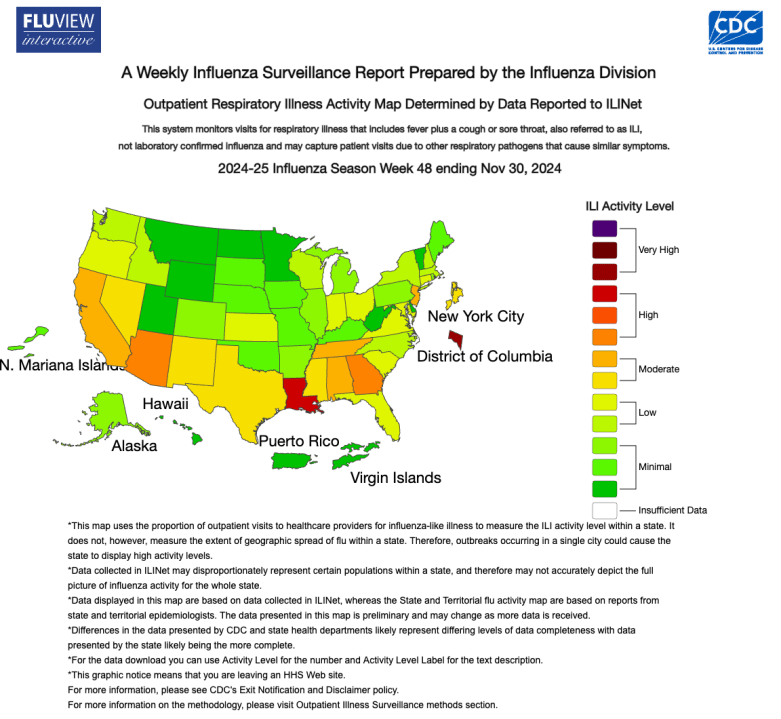[ad_1]
(NEXSTAR) – Flu activity spiked in states across the U.S. during the last week of November, according to a new report from the Centers for Disease Control and Prevention (CDC).
Data from FluView, a weekly collaborative effort between the CDC and numerous health and statistical workers across the country, shows the virus’ activity level climbing in numerous states, many in the southern half of the U.S.
Texas, Nevada, California, Mississippi, Alabama and Tennessee all went from low levels to moderate levels as of estimated activity, with Arizona, Louisiana, Georgia and Washington D.C. at high levels.
“For COVID and the flu, if you catch it earlier there are certainly treatment options out there, and that’s why I always say don’t necessarily focus on the symptoms,” Dr. Ulysses Wu, chief epidemiologist for Hartford HealthCare, told Nexstar’s WTNH.
Wu added that many people often confuse early symptoms of COVID or the flu with allergies, and emphasized that seeking medication within the first five days can be crucial in getting treatment to minimize the illness.

The CDC points out that reporting is voluntary and the report tabulates visits for respiratory illness that includes fever plus a cough or sore throat, not laboratory confirmed tests.
Should I still get vaccinated?
Health experts recommend people get vaccinated, even if they failed to do so in the early fall. It takes about two weeks for the body to build up immunity after getting a shot, so now would be a good time to get vaccinated before the next round of holiday gatherings.
With travel and more time indoors around friends and family, cases of COVID-19 and the flu tend to climb in November or December with COVID generally peaking in January and the flu in January or February.
Short on time? You can get both your flu and COVID-19 shots at the same appointment, medical experts advise. Don’t call them boosters — they’re not just another dose of last year’s protection. The coronavirus and influenza are escape artists that constantly mutate to evade your body’s immune defenses, so both vaccines are reformulated annually to target newer strains.
While they’re not perfect, vaccinations offer strong protection against a bad case of flu or COVID-19 — or dying from it.
“It may not prevent every infection but those infections are going to be less severe,” said Dr. Demetre Daskalakis of the Centers for Disease Control and Prevention. “I would rather have my grandmother or my great-grandmother have a sniffle than have to go to the emergency room on Thanksgiving.”
Last year, just 45% of adults got a flu vaccination and even fewer, 23%, got a COVID-19 shot.
“Our best defense to protect ourselves, our loved ones and all those around us is a simple shot,” Dr. Bruce A. Scott, president of the American Medical Association, said in a recent statement.
The Associated Press contributed to this report.
[ad_2]
Source link

